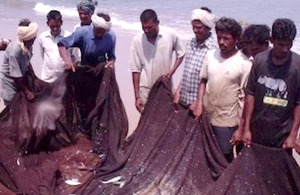DFID Research: managing the world's fish resources
DFID research has developed tools for managing and assessing fish stocks.

Beach Seine net fishers in Andhra Pradesh, India. Picture: Dan Hoggarth
The world’s fish stocks are over exploited, but better management can improve stocks to ensure that fisheries will thrive in the future. The sector is essential to the livelihoods of the poor, providing nutrition, food security and supporting alternative forms of income. Better management is urgently needed to ensure sustainability, and poverty alleviation.
Guiding good management
That is why the DFID Fisheries Management Science Programme (FMSP) has developed a set of guidelines and tools, to offer advice on how to manage and assess a fishery. Based on research collected over the last 10 years, the step-by-step guides indicate how to derive indicators of achievement related to locally set goals, which the management plan can work towards. The guides have been used as a resource for local fisheries, training institutions, managers and scientists. In India, for example, the Central Institute of Fisheries Education is using FMSP stock assessment tools as part of its training curriculum.
Seas of change
It is not easy to predict how the livelihoods of poor people will be affected by better fisheries management in the future. The impact of better management on livelihoods and the environment is difficult to monitor and predict. However this research has bridged an important gap between resource assessment and management. Importantly it has also made the role of scientists and managers clear and highlighted that they must work together to get the best results. Given the scale of the fisheries and the number of people involved the potential impacts of any resulting improvements in management are significant. Fishery assessment tools developed through this programme have already been applied in more than 25 countries.
Being ‘in the know’
Good management and stock assessment cannot be carried out in isolation. To achieve this the active participation of Bangladeshi, Indian and Caribbean partners in the programme has been vital in developing the approach presented in the paired set of manager’s and stock assessment guides. These detail how to apply new fishery assessment technology within a management context. Such information has provided training courses in over 11 countries, and globally, over 4,500 people are aware of the tools and guidelines developed by the FMSP. At every step, fisheries need relevant goals, good control - and knowledge. In the Seychelles for example, the Fishing Authority has used FMSP tools to establish management reference points and monitor indicators of the status of its fishery for snappers and groupers. The guide ‘How to manage a fishery’ was used by the Lake Victoria Fisheries Office to develop a fisheries decision support tool. New information such as this is vital to ensure that fisheries have a future.
DFID-funded projects on fish stock assessment include:
- R8468 - Capacity building in the use of FMSP stock assessment tools and management guidelines
- R8464 - Application and promotion of FMSP participatory fisheries stock assessment (ParFish)
- R8397 - Uptake of participatory fisheries stock assessment (PFSA) tool kit
- R8360 - Synthesis and uptake promotion of FMSP stock assessment tools and guidelines